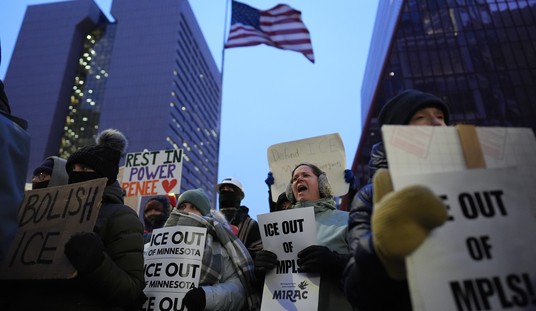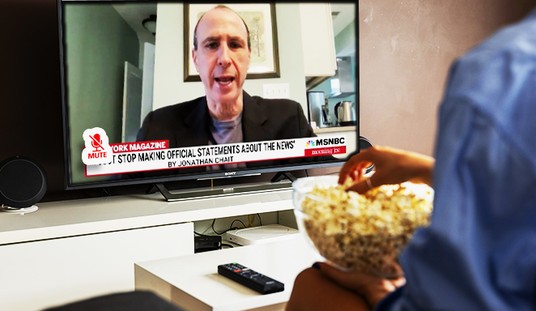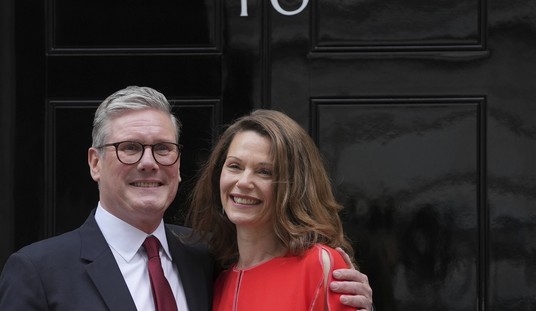Last night, Meet the Press host Chuck Todd appeared on the Hugh Hewitt show as I guest hosted for Hugh Hewitt, and we spoke about several topics, including Cuba and the US response to the Sony hack. We stepped away from the headlines of the moment to take a look behind the scenes of the 2016 Republican primary fight, which started this week with the surprise entry of Jeb Bush into the race. That had touched off a food fight among the donors, we’d heard, and Chuck had heard similar rumblings. Bush had to jump in early to convince donors that he was taking 2016 seriously, and the jump he got may have “made life miserable for both [Chris] Christie and [Mitt] Romney right now”:
EM: That’s a good question. We’re going to keep an eye on that. Chuck, I want to change gears here just a little bit. Look towards 2016. Now we’re hearing a little bit that there seems to be a big knife fight developing between the Jeb Bush team and the Chris Christie team on donors. Are you hearing anything about this?
CT: Look, I wouldn’t call it a knife fight. I mean, I think it’s if, you know, I think, you know, I think Christie’s going to be on the losing end of this. I mean, look, what Jeb Bush did, and is, I think Jeb knew that a lot of people were skeptical of if he was serious, okay? I certainly was a skeptic. I certainly talked to people close to him that made me feel comfortable being sort of a 55% skeptic, meaning I just was more convinced he wouldn’t than would. And donors were in that same place. And in order to make them believe, he had to go early. They wanted to believe. Well, he did. And so this was about sending a message to Christie and Romney, okay, stop talking down, talking me down to these donors, because they’re all fishing in the same donor pond, the three of them. So, and all this stuff through the circular telephone and all, I mean, it is gossip central in that world. Jeb really made life miserable for both Christie and Romney right now.
EM: So it’s getting cutthroat, then, in that small pool of the large donors, then?
CT: Well, yes, but it’s a large pool. I mean, look, Jeb Bush basically is the number one fundraiser, right now, will end up being the number one big fundraiser in Texas, the number one big fundraiser in Florida, the number one big fundraiser in California, and he might end up being the number one guy even in Wall Street in New York, because remember, a sitting governor has to be careful who he raises money from on Wall Street. It’s a big, it’s a little bit of an arcane issue, but there’s a lot of issues there with sitting governors when it comes to raising Wall Street money.
EM: Right.
CT: So…on what’s legal and what’s not, even when they’re running for president. So you know, Jeb is in the pole position financially in ways that I think both Christie and Romney hoped they could have been that guy.
EM: I am very surprised to hear that, actually. It’s been 14 years since Jeb’s run for any office. Nobody’s worried about that?
CT: Well, his donor network has always been strong. Look, I think, look, we’re just talking about money. I’m with you. I think he could be out of shape politically. He certainly has issues with base conservatives. I’m going to have a little chart, actually, on Sunday that I’m going to show folks that shows that among Republican primary voters that we surveyed, you know, he’s fifth among Tea Partiers, okay, when it comes to could find themselves supporting. Fifth, okay? He’s first or second among every other demographic group of said Republicans, but fifth among Tea Party, or you know, folks that call themselves or supportive of Tea Party. Well, that’s your sort of populist, grassroots conservative. And that’s where he’s got problems. But Ed, if you’re advising him, if you want to be the nominee, what do you do? Get in early and start dealing with your problems. Well, what’s Jeb doing? Getting in early and seeing how deep his problem is.
How deep is Bush’s problem? Pretty darned deep, as I wrote this week for The Fiscal Times, and not just because of his policy disconnects from the conservative grassroots, and not just because he himself might be out of top campaign shape. He’s a candidate of the past when the Republican Party has so many viable options for looking to the future instead:
The difference [in 2012], though, was that the GOP didn’t have many options for nominees that reflected the post-George W. Bush era of the party. That was one of the prime drivers of the unusual anyone-but-Mitt dynamic in polling seen in late 2011, as candidates from Herman Cain to Michele Bachmann enjoyed brief moments at the top of national polls. The only two sustained challenges to Romney’s dominance in the primary campaign, Rick Santorum and Newt Gingrich, had been political figures from the Clinton era, out of office for four and twelve years, respectively. The only practical options available to a new generation of Republicans were choices from the previous generation.
In 2016, that will no longer be the case. Most of the field will have reached their peak during the post-Bush era. Scott Walker just won a second term in Wisconsin after staving off a recall in retaliation for public-employee union reforms. Bobby Jindal won a second term without a runoff in Louisiana after his public-education and political reforms. Susana Martinez won another term after cleaning up the corruption from her predecessor.
Mike Pence, John Kasich, Nikki Haley, and even Chris Christie are all governors with second terms whose rise parallels that of the present makeup of the party. On top of those, Senator Marco Rubio has plans for the White House, and the present controversy over the change in relations with Cuba will fuel his passion and remind people that his was the first real Tea Party insurgency against the old establishment in the 2010 cycle.
It’s not that Jeb Bush would make a poor President. It’s just that he’s all about the past of the party, in the same way that Hillary Clinton is all about the Democratic Party’s past, both of the Clinton era and of the Obama era that has voters looking for real change once again. Republicans have to ask themselves whether they want to keep looking to the past, or looking to the future – and this time they have real options for choosing the latter.
The rest of the interview with Chuck Todd can be read here. Be sure to read how the absence of Harry Reid’s “pocket veto” will force Obama to choose whether to partner with progressives or Republicans in the next two years — and why Todd thinks Obama will choose the latter.








Join the conversation as a VIP Member